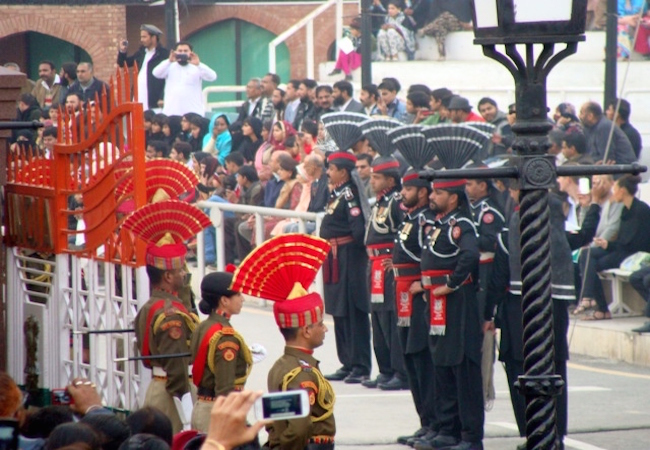Significance of strategic restraint regime in South Asia

By Asma Khalid
Regional competitive environment of South Asia has fueled the strategic tension and security anxieties between India and Pakistan. India and Pakistan share a history of hostile relations and bilateral relations of both nuclear states have been strained by a number of historical and political issues. Both states have fought number of wars and limited conflicts since partition. Due to prioritization of security concerns of regional states, South Asia is undergoing through nuclear and conventional arms modernization. However, the inception of nuclear weapons in the South Asia has not only maintained the deterrence stability in region but at the same time instigate the nuclear and missile arms race in the region. Thus under such circumstances, in the aftermath of Indian and Pakistan’s nuclear tests in1998, Pakistan proposed the establishment of Strategic Restraint Regime (SRR) to India for durable peace in South Asia. But unfortunately India’s Prime Minister “Atal Bihari Vajpyee” rejected the Pakistan’s proposal of Strategic Restraint Regime.
In February 2016, in response to India’s growing conventional and strategic weapons’ development in the region, Pakistan’s officials re-emphasized on its desire for establishing the Strategic Restraint Regime (SRR) in South Asia” due to its significance. So question arises why SRR is imperative in region??
Strategic restraint Regime is significant due to its three inter-connecting elements: First, nuclear restraint to maintain deterrence stability; second, conventional arms balance; third, for conflict prevention and conflict resolution. Primary objective of Strategic Restraint Regime was to prevent nuclear arms race on the region as India-Pakistan relations has been dominated by action-reaction syndrome. Strategic Restraint regime would be helpful in maintaining strategic and Deterrence stability and accelerating a peace process in the region. They can be employed to build trust between India and Pakistan, and resultantly avert the chances of conflict escalation. They may include any sign of peace initiative to a treaty. By effective implementation of strategic Restraints both states will be able to take their decisions more confidently in a less hostile and more stable environment.
it is unfortunate that, despite the Pakistan’s efforts of establishment of Strategic restraints arrangement, India has emerged as largest arms imported of the world in 2017. According to Stockholm International Peace Research Institute (SIPRI) report of 2016, with 14% global arms imports India is world’s largest arms importer. Therefore, objective of SRR has not been achieved due to two factors: First: India’s intention to emerge as regional power. Second: Due to the role of external powers like United States and Russia. India’s co-operation in conventional and nuclear fields with United States and Russia especially India-US civil nuclear deal and 2008 waiver for Nuclear Suppliers Group (NSG) has undermined the objectives of SRR as well as disturbed the balance of power (BOP) in region.
Pakistan has been concerned over India’s arms agreements, Nuclear Submarine, Ballistic Missile Development (BMD) system and Missile development as these capabilities are leading India towards higher war-fighting capabilities from its minimum deterrence posture. These capabilities will increase the instability in region and forces the regional states to acquire these capabilities to maintain deterrence and Balance of Power in region. Additionally, Indian missile developments have dangerous implications. According to reports, India have fastest growing missile program of the world India have ability to produce 90 to 110 nuclear warheads and its fissile material production stock is increasing rapidly. Indian nuclear and nuclear related developments have direct implications on Pakistan and regional states because these developments are considered as threat to their security, regional stability and peace. Therefore in response to India’s nuclear and missile developments, Pakistan is forced to limit its resources of national building and human development to maintain strategic balance with India.
Such factors are fueling the arms race in region, arms race is world-wide phenomena that instigate the Security dilemma and disturb the Balance of Power. It poses negative impact on security and strategic calculus of state and influences the political, economic progress, human development and other elements of state. Impacts of arms race are dangerous as it affects the state’s security as well as pose the serious threats to human security of states as high military expenditures are resulting in fewer budgets for social development.
So, to address the regional security issues and negative impacts of arms race, Pakistan demands for nuclear and conventional restraints. In this regard: India’s acceptance of Pakistan’s proposal, Nuclear Confidence Building Measures (NCBMs), economic progress and continued effective diplomacy can open the ways to a strategic restraint arrangements between India and Pakistan to maintain deterrence stability in the region.
Asma Khalid is a Research Associate at Strategic Vision Institute, a think-tank based in Islamabad.




